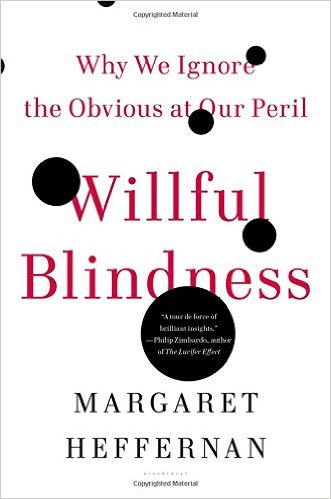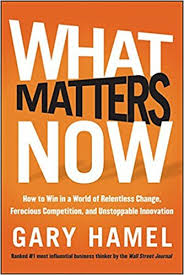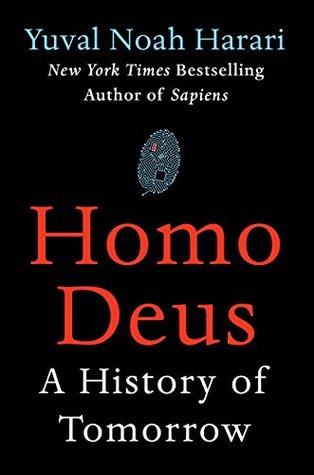There’s a few reading lists doing the rounds so I thought I’d jump on the bandwagon and give you my personal favourites.
I’ve chosen 10 books that have helped shape and challenge my views on HR and why and how it can be done differently. Here’s the first five (well, six actually as there’s two from the same author). There’s some classics in there but I hope there might be something new for you too. Enjoy!

1. Willful Blindness by Margaret Heffernan
I could listen to Heffernan reading a shopping list. If you haven’t watched her speak, catch her TedTalk here. In Willful Blindness she argues that the biggest threats and dangers we face are the ones we don’t see – not because they’re secret or invisible, but because we’re willfully blind. She examines the phenomenon and traces its imprint in our private and working lives, and within governments and organisations, and then goes on to outline some of the mechanisms, structures and strategies that institutions and individuals can use to combat it. Brilliantly written. Super smart. And check out Chapter 10 on why bonuses are so damaging.

2. What Matters Now by Gary Hamel
The book is described as a multi–faceted agenda for building organisations that can win in world of relentless change, ferocious competition, and unstoppable innovation. Hamel asks, “What are the fundamental, make–or–break issues that will determine whether your organisation thrives or dives in the years ahead?” He suggests five:
Values: With trust in large organisations at an all-time low, there is an urgent need to rebuild the ethical foundations of capitalism. What′s required is nothing less than a moral renaissance in business.
Innovation: Innovation is the only defence against margin–crushing competition, and the only way to outgrow a dismal economy. In too many companies, innovation is still a buzzword, rather than the responsibility of every single individual. This must change.
Adaptability: In a world of accelerating change, every company must build an evolutionary advantage. The forces of inertia must be vanquished. The ultimate prize: an organization that is as nimble as change itself.
Passion: In business as in life, the difference between “insipid” and “inspired” is passion. With mediocrity fast becoming a competitive liability, success depends on finding new ways to rouse the human spirit at work.
Ideology: Today, businesses need more than better practices; they need better principles. Bureaucracy and control have had their day. It′s time for a new ideology based on freedom and self–determination.
It’s enjoyable to read as Hamel writes with an orator’s passion and richness of language but what really resonated with me was his views on building innovation from the ground up. Essential reading for HR Directors who are tempted to embark on a top down programme of change!


3. Sapiens and Homo Deus by Yuval Noah Harari
I can’t lie – I haven’t actually understood everything that he writes about – he’s a frigging genius! But if we in HR are the professed “people experts”, then in my opinion, we ought to know more than we do about how humans function. The first book “Sapiens” explores how the human race came into being and offers amazing insights into how our brains work, how we communicate, how we network and build relationships, why we discriminate, our attitudes towards money, what makes us happy – and so on. The second, “Homo Deus” concerns itself with the future of humankind and poses three possible scenarios; (i) we become obsolete as computers become more intelligent, (ii) we become increasingly reliant on technology to make our decisions, until one day they know us better than we know ourselves, and (iii) a small group of elite, upgraded superhumans emerge to dominate other humans using technology and computer algorithms. I’m not saying that these books will help with the everyday tasks of HR – but they do challenge many of the pre-conceived ideas that sit behind them.

4. Drive by Daniel Pink
It amazes me that despite this classic having been around for nearly 10 years, our reward and recognition practices still rely predominantly on dangling financial carrots. This book provides us with more proof than we can handle that monetary incentives rarely, if ever, provide long term performance improvements and worse – they can diminish performance, crush creativity and encourage unethical behaviour. Sadly, Pink’s convincing alternatives for motivating performance; mastery, purpose and autonomy, are still largely absent from our performance and reward mechanisms. If you can’t face reading the book – here’s a great video summary.
5. Now Discover Your Strengths by Marcus Buckingham
I first read this 15 years ago but it was the first business book that I actually managed to finish! Whilst there’s a fun individual assessment included, what I loved about this book was that it offers this one, fundamental piece of insight; while most of the world is focused on identifying and repairing flaws and weaknesses, the truly successful among us are doing virtually the opposite. Knowing our strengths and focusing on utilising them sounds so obvious – but if you think about it, so much of what we do in HR either ignores them or worse, focuses on improving what we’re not so great at. Whether it be the questions we ask at interview, the way we design jobs, our approach to induction, our competency frameworks, our performance reviews or our learning and development – few of them are “strength based”. As with Dan Pink’s Drive, this book can still help us think differently about HR.
So, that’s the first five (6) – the remaining five will follow shortly! Would be good to know which books have disrupted your thinking about HR.
Get even more Disruptive HR content and join our Club – the go-to place for people who want to change HR!
Recent Posts
Lessons from a scandal: Should bonuses be paid for ‘just doing the right thing’?
April 22, 2024The scandal of the Post Office, where managers are being incentivised to help with the public inquiry, begs the question - should we ever pay bonuses just 'for doing the right thing'?
Health and Wellbeing: Less Zoom Yoga, More Trust
April 2, 2024We should question whether our healthy snacks and instructive posters are addressing the real barriers to feeling well. Should HR be the caring parent and provide the right kinds of food, exhortations and education? Or should we look to reduce the things that create the stress in the first place?
How to help your leaders be more curious
March 4, 2024Being curious is good for us and our organisations, but some of us do it less than others. This blog explores how we can help leaders to show more curiosity.